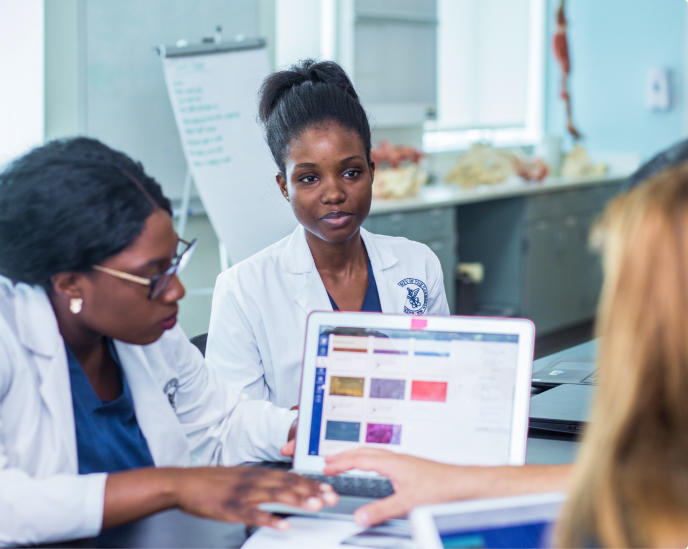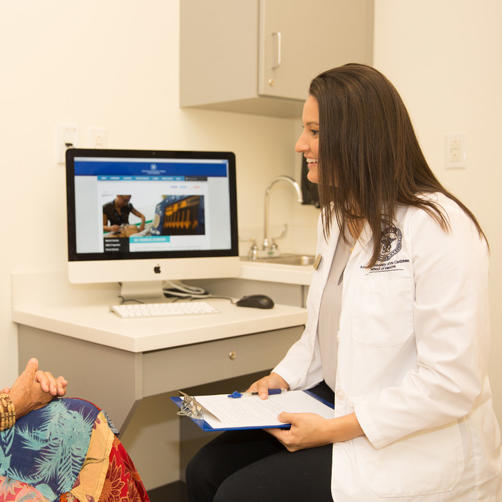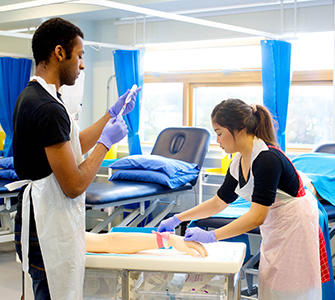There are many questions to answer along the medical career pathway. One of them might be: do I want to be a physician or a physician assistant (PA)? Both physicians and PAs are experienced and qualified medical professionals, and they do many of the same things: diagnose illnesses, develop and manage treatment plans, and prescribe medications. Physicians, however, are medical doctors, and PAs are considered medical support professionals. The two roles have similarities, but there are some big differences between a PA vs MD, and their training and qualifications also differ. Those differences are explained below. Consider the factors for each profession, and then choose the one that suits you best. If you are uncertain which path to take, consider these questions:
- Do you want the authority and prestige that comes with being a physician?
- Are you ready for 11 eleven or more years of school and training?
- Do you want a wide variety of career paths and opportunities?
- Do you want a faster track—as little as six years—to a medical career?
- Do you want to combine education with real-world work experience?
If you answered “yes” to any of these questions, then a career as either a PA or MD may be a the good best choice for you.
WHAT KIND OF TRAINING DO PHYSICIANS AND PHYSICIANS ASSISTANTS NEED?
After four years of undergraduate work, future physicians go to a four-year medical school—such as the American University of the Caribbean School of Medicine (AUC)—to achieve a Doctor of Medicine (MD) degree or a Doctor of Osteopathy (DO) degree. After graduation, physicians must then complete a residency of at least three years, during which they usually complete the examination for licensure. Doctors can then go into practice or continue their studies and training to qualify in a broad number of specialties. Physicians may be certified by the American Board of Internal Medicine or by the board of their eventual specialty, and they may apply for membership in the American Medical Association (AMA) or other professional societies.
Future physician assistants also complete four years of undergraduate work, usually in pre-med or biological sciences. Most PA candidates then work in medical fields to gain experience prior to applying to physician assistant master’s programs. Future PAs may work as certified nursing assistants or registered nurses, as emergency medical or emergency room technicians, as lab or medical assistants, or as paramedics or surgical technicians. Some PAs gain experience in the Peace Corps or in the military as medics or medical corpsmen. With the appropriate education and experience, candidates can enter a two- or three-year physician assistant Master of Science (MS) program. After graduation, PAs must pass the Physician Assistant National Certifying Exam to obtain a license to work. PAs are certified by the National Commission on Certification of Physician Assistants, and they may apply for membership in the American Academy of Physician Assistants (AAPA). After this they are recognized as a PA-C.
What is the difference between the years of school for a PA-C vs MD? MDs face a minimum of 11 years of education and training. PAs can achieve their MS degree in as little as six years. But because work experience is often key to getting into a PA master’s program, the PA’s journey may be eight or more years.
WHAT ARE THE DIFFERENCES BETWEEN PHYSICIANS ASSISTANTS VS MD'S WORK?
You may be wondering what the difference is between a PA vs MD’s normal routine. Physicians are their own authorities, and they may work in a clinic, hospital, or medical office, and some have their own private practice. A doctor’s time is spent caring for outpatients, doing laboratory work, performing procedures and tests, discussing cases with other doctors, and visiting hospital wards. Doctors also communicate and work with physician assistants, nurses, and many other medical professionals. Meetings and administration tasks absorb a lot of time, and hours are also spent consulting with specialists, doing research, studying, and teaching.
Another difference between PA and MDs is that physicians may practice internal or family medicine and provide primary care. This covers the entire well-being of patients and includes numerous tasks and procedures. Physicians may also advance to specialty care and concentrate on such areas as dermatology, pediatrics, neurology, or surgery. The Association of American Medical Colleges (AAMC) lists more than 135 medical specialties and subspecialties.
PA doctors work in all the same places as physicians, but they have limited autonomy. To ensure quality of healthcare, the AMA requires PAs to work under the supervision of a doctor. In some parts of the United States, regulations insist on the personal presence of a doctor, but most states only require that doctors be available for consultation through telephone or electronic communication. In many educational facilities, federal or state institutions, health clinics, and nursing homes, there may be no physicians present and PAs are the primary healthcare providers.
Most PA doctors practice general medicine to provide primary care, but they can also advance to specialty care and concentrate on such areas as critical care, emergency or hospital medicine, or general surgery. The AAPA lists 26 professional specialty organizations for PA specialists.
Both physicians and PA doctors may work a typical 40-hour week, and both are also often on-call—available for consultation at night or on days off. Both physicians and PA doctors are expected to continue their education and periodically recertify throughout their careers.
ARE THERE ADVANTAGES TO BEING A PA VS MD?
You might be wondering if there is an advantage to being a physician assistant vs doctor. Obtaining either a Doctor of Medicine degree or a Master of Science degree as a physician assistant gives people a great education and solid career opportunities. Physicians are paid more than PAs, however, and they have greater authority and prestige as well as more work and career options. PAs need considerably less time to become licensed and go to work, though, and PAs do not bear the ultimate burden of responsibility the way doctors do. Many people choose the PA path because it is not practical for them or possible to set aside the eleven or more years needed to become a doctor. Others become PAs because it is exactly what they want to do. In the end, both physicians and physician assistants are highly qualified and capable medical professionals.
As demand for healthcare services grows, both physicians and physician assistants will be needed to provide care to patients. The U.S. Bureau of Labor Statistics (BLS) predicts steady growth in job opportunities for all physicians over the next several years. Doctors are an aging population, and as those doctors retire, the United States will see an increasing shortage. In July 2020, an AAMC report showed that one third of U.S. physicians are age 60 or older, and well over half—57 percent—are over 50 years old. The BLS also projects the employment of physician assistants to grow 31 percent from 2019 to 2029, much faster than the average for all occupations.
If you choose to become a physician after deciding between the PA vs MD route, AUC can help you get started on your path to success. AUC School of Medicine has a strong history of placing graduating students in internal medicine or specialty residencies. In 2020, 92 percent of AUCSM graduates earned residencies throughout the United States and Canada. Take the next step on your path to becoming a physician: apply for admission to AUCSM.
Related resources:




